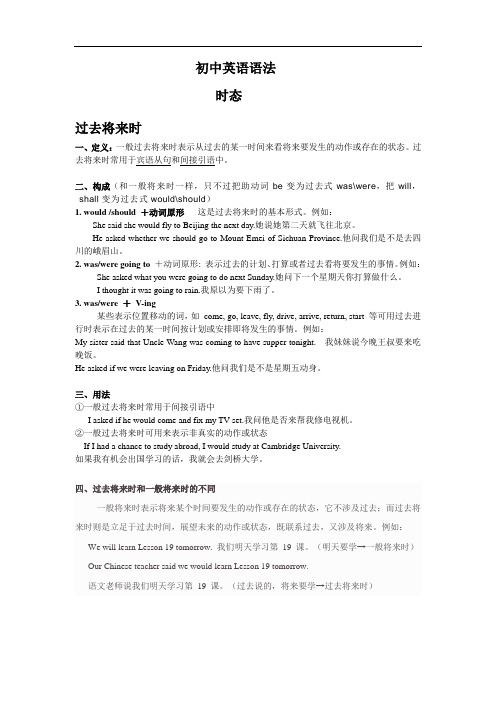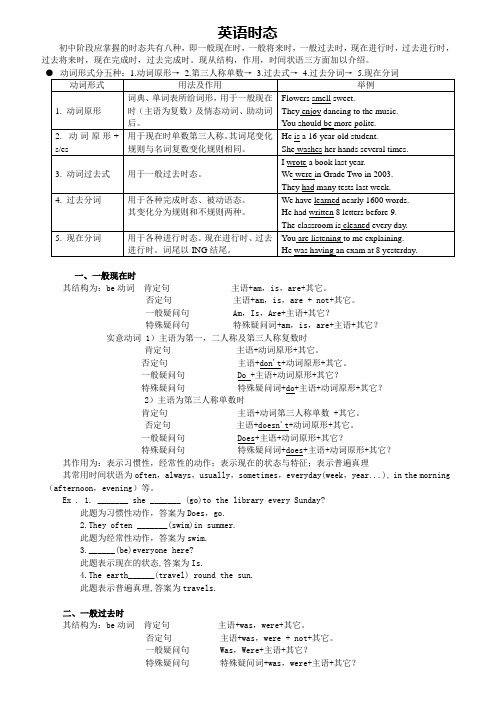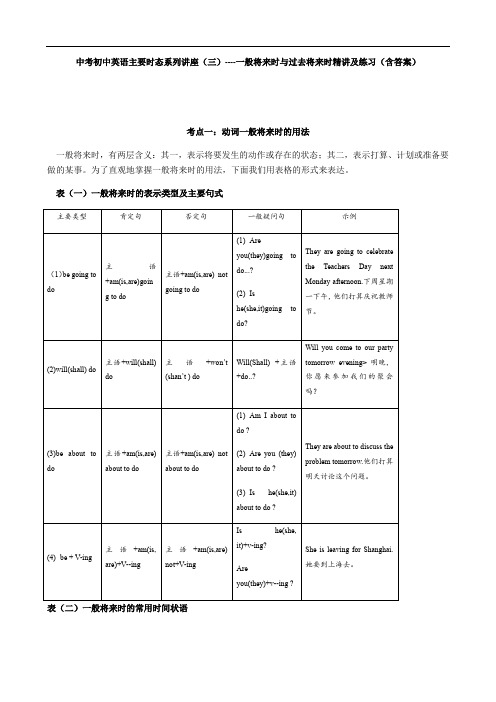初中英语时态 一般将来时 过去将来时
英 语语法 过去将来时及初中时态归纳

初中英语语法时态过去将来时一、定义:一般过去将来时表示从过去的某一时间来看将来要发生的动作或存在的状态。
过去将来时常用于宾语从句和间接引语中。
二、构成(和一般将来时一样,只不过把助动词be变为过去式was\were,把will,shall变为过去式would\should)1. would /should +动词原形这是过去将来时的基本形式。
例如:She said she would fly to Beijing the next day.她说她第二天就飞往北京。
He asked whether we should go to Mount Emei of Sichuan Province.他问我们是不是去四川的峨眉山。
2. was/were going to+动词原形: 表示过去的计划、打算或者过去看将要发生的事情。
例如:She asked what you were going to do next Sunday.她问下一个星期天你打算做什么。
I thought it was going to rain.我原以为要下雨了。
3. was/were +V-ing某些表示位置移动的词,如come, go, leave, fly, drive, arrive, return, start 等可用过去进行时表示在过去的某一时间按计划或安排即将发生的事情。
例如:My sister said that Uncle Wang was coming to have supper tonight. 我妹妹说今晚王叔要来吃晚饭。
He asked if we were leaving on Friday.他问我们是不是星期五动身。
三、用法①一般过去将来时常用于间接引语中I asked if he would come and fix my TV set.我问他是否来帮我修电视机。
②一般过去将来时可用来表示非真实的动作或状态If I had a chance to study abroad, I would study at Cambridge University.如果我有机会出国学习的话,我就会去剑桥大学。
(完整版)英语常用的八种时态

英语时态初中阶段应掌握的时态共有八种,即一般现在时,一般将来时,一般过去时,现在进行时,过去进行时,过去将来时,现在完成时,过去完成时。
现从结构,作用,时间状语三方面加以介绍。
一、一般现在时其结构为:be动词肯定句主语+am,is,are+其它。
否定句主语+am,is,are + not+其它。
一般疑问句 Am,Is,Are+主语+其它?特殊疑问句特殊疑问词+am,is,are+主语+其它?实意动词1)主语为第一,二人称及第三人称复数时肯定句主语+动词原形+其它。
否定句主语+don't+动词原形+其它。
一般疑问句 Do +主语+动词原形+其它?特殊疑问句特殊疑问词+do+主语+动词原形+其它?2)主语为第三人称单数时肯定句主语+动词第三人称单数 +其它。
否定句主语+doesn't+动词原形+其它。
一般疑问句 Does+主语+动词原形+其它?特殊疑问句特殊疑问词+does+主语+动词原形+其它?其作用为:表示习惯性,经常性的动作;表示现在的状态与特征;表示普遍真理其常用时间状语为often,always,usually,sometimes,everyday(week,year...), in the morning (afternoon,evening)等。
Ex . 1. _______ she _______ (go)to the library every Sunday?此题为习惯性动作,答案为Does,go.2.They often _______(swim)in summer.此题为经常性动作,答案为swim.3.______(be)everyone here?此题表示现在的状态,答案为Is.4.The earth______(travel) round the sun.此题表示普遍真理,答案为travels.二、一般过去时其结构为:be动词肯定句主语+was,were+其它。
动词与时态三10(一般将来和过去将来时)

一般将来时定义:一般将来时表示将来某个时间将要发生的动作或存在的状态,也表示将来经常或反复发生的动作。
常见时间标志词:tomorrow,tomorrow morning (afternoon,evening),next +时间(next night,next Monday …,next week,month…,next summer…,next year),in (the)future (将来),soon (不久之后),in +时间(in five days——再过五天,in two weeks——再过二星期),etc.基本结构:①主语+be going to + do;②主语+will+ do.③主语(只能为I /We)+shall+do否定句:在①be动词(am, is, are)后加not;②will后加not成won’t;③shall后加not成shan’t一般将来时的构成1.(I):主语+shall/will+其他..肯(否)定句的构成:主语+ Will(not)+动词原形+其他E.g; You will feel better after this medicne.( 表示预见)They will/won't go shopping this afternoon.We shall/shan't be there before dark.疑问句的构成:Will+主语+动词原形+其他?E.g:Will they go shopping this afternoon?Shall we go to the park?回答方式:Yes,主语+will. No 主语+won’t备注:无论主语是第几人称,都可以will,但是shall后只能用在第一人称I ,We后面E.g:I shall (will) learn English next year.Shall we walk to school tomorrow?-----Yes,we shall. No,we shall not2.(II):主语+be going to +…(表示即将发生的或最近打算进行的事)肯(否)定句的构成:主语+be (not) going to +..E.g:We are going to have a picnic this weekend.I t is going to rain.疑问句:Be+主语+going to +动词原形+。
掌握时态一般将来时和过去将来时

掌握时态一般将来时和过去将来时一般将来时和过去将来时是英语中常用的两种时态形式,它们帮助我们描述将来发生的动作或事件,同时强调时间的关系。
在本文中,我们将重点探讨这两种时态的用法和相应的例句。
一、一般将来时(Simple Future Tense)一般将来时用来表达将来某个时间发生的动作或事件。
我们可以使用以下几种结构来构成一般将来时:1. 使用“will + 动词原形”构成句子,表示决定或预测的未来动作或事件。
例如:- I will visit my grandparents this weekend.(我会在这个周末去拜访我的祖父母。
)- He will be a doctor when he grows up.(他长大后会成为一名医生。
)2. 使用“be going to + 动词原形”表示计划、意愿或打算去做某事。
例如:- I am going to study abroad next year.(明年我打算出国留学。
)- She is going to have a party on Friday.(她打算在周五举办一个派对。
)3. 使用“shall + 动词原形”构成句子,表示“我将”,主要用于“我们”(“we”)和“我”(“I”)。
例如:- We shall meet at the park tomorrow.(明天我们将在公园见面。
)- Shall I help you with the bags?(我应该帮你拿行李吗?)二、过去将来时(Future in the Past Tense)过去将来时用于描述在过去某个时间点将来会发生的动作或事件。
我们可以使用以下结构来构成过去将来时:1. 使用“would + 动词原形”构成句子,表示过去某个时间点的将来动作。
例如:- He said he would come to the party.(他说他会来参加派对。
)- She told me she would give me a call later.(她告诉我她稍后会给我打电话。
最新中考初中英语主要时态系列讲座(三)----一般将来时与过去将来时精讲及练习(含答案)

中考初中英语主要时态系列讲座(三)----一般将来时与过去将来时精讲及练习(含答案)考点一:动词一般将来时的用法一般将来时,有两层含义:其一,表示将要发生的动作或存在的状态;其二,表示打算、计划或准备要做的某事。
为了直观地掌握一般将来时的用法,下面我们用表格的形式来表达。
表(一)一般将来时的表示类型及主要句式表(二)一般将来时的常用时间状语表Array(三)一般将来时的主要用法【典型考例1】(2019天津)---What is your plan for next weekend,Lingling?----I volunteer work in the museum.A. was doingB. didC. have doneD. am going to do【析】正确答案D。
句意是:玲玲,下周末的安排是什么?我打算到博物馆去作志愿者。
根据上文的next weekend(下周末)可知,玲玲的回答是指下周的打算,所以用一般将来时,因此,正确答案为D。
【典型考例】(2019四川内江)---Have you watched the new movie,Joe?---No,I________ it with my sister this evening.A.watch B.are watching C.watched D.will watch【析】正确答案:D。
句意是:乔,你看了这部新电影吗?没有。
我今晚将和我妹妹一起去看。
根据本句末的时间状语this evening可知,看新电影这动作是将来要做的事情,因此动词使用一般将来时。
所以,正确答案为D。
【典型考例】(2019天津)----Could you tell me for the fruit?----By paying over the Internet.A. how much will I payB. how much I will payC. how will I payD. how I will pay【析】正确答案D。
初中英语8大时态思维导图

初中英语8⼤时态⼀般现在时⼀般过去时⼀般将来时概念:经常、反复发⽣的动作或⾏为及现在的某种状况常搭配的时间状语:always,usually,often,once a week, etc过去将来时概念:过去某个时间⾥发⽣的动作或状态;过去习惯性、经常性的动作、⾏为常搭配的时间状语:ago,yesterday,last month,etc概念:表⽰将要发⽣的动作或存在的状态及打算、计划或准备做某事时间状语:tomorrow,next day,soon,in a few minutes等现在进⾏时过去进⾏时概念:⽴⾜于过去某⼀时刻,从过去看将来,常⽤于宾语从句中常搭配的时间状语:the next day/morning the following month.etc概念:表⽰现阶段或说话时正在进⾏的动作及⾏为。
常搭配的时间状语:now,at this time,these days eto概念:表⽰过去某段时间或某⼀时刻正在发⽣或进⾏的⾏为或动作现在完成时时间状语:at this time ,yesterday,at that time或以when引导的谓语动词是⼀般过去时的时间状语等概念:过去发⽣或已经完成的动作对现在造成的影响或结果,或从过去已经开始,持续到现在的动作或状态现在完成时⽤法之常⽤词语:能与现在完成时连⽤词语很多,如副词just,already,yet,before等过去完成时概念:过去完成时表⽰在过去某⼀时间或动作之前已经发⽣或完成了的动作,即"过去的过去past-in-the-past"常搭配的时间状语:before,bytheendoflast year(term,month),etc。
初中英语6个时态
初中英语6个时态
初中英语六个时态分别是:现在进行时、现在完成时、现在完成进行时、一般过去时、一般将来时和过去将来时。
1. 现在进行时:表示现在正在进行的动作或存在的状态,基本结构是be动词(am/is/are)+动词的现在分词(动词+ing)。
2. 现在完成时:表示动作发生在过去但与现在有联系,基本结构是have/has+动词的过去分词(done)。
3. 现在完成进行时:表示动作从过去开始一直持续到现在,并且还会继续下去,基本结构是have/has+been+动词的现在分词(doing)。
4. 一般过去时:表示在过去某个时间发生的动作或存在的状态,基本结构是动词的过去式。
5. 一般将来时:表示将来某个时间将要发生的动作或存在的状态,基本结构是will+动词原形。
6. 过去将来时:表示在过去某个时间将要发生的动作或存在的状态,基本结构是would+动词原形。
一般将来时与过去将来时知识点总结
一般将来时与过去将来时知识点总结一、一般将来时1.肯定句的结构为:主语 + will + 动词原形 + 其他成分例如:- I will go to the park tomorrow.(我明天将去公园。
)- They will have a meeting next week.(他们下周将开会。
)2.否定句的结构为:主语 + will not(won’t)+ 动词原形 + 其他成分例如:- We won’t be late for the concert.(我们不会迟到演唱会。
)3.疑问句的结构为:Will + 主语 + 动词原形 + 其他成分?例如:- Will you help me with my homework?(你会帮我做作业吗?)4.一般将来时还可以用于表示打算、意向、承诺、警告等。
例如:- We will visit our grandparents this weekend.(我们本周末会去看望祖父母。
)- He will work hard to pass the exam.(他会努力学习以通过考试。
)- I won’t accept the j ob offer.(我不会接受这个工作机会。
)5.当表示将来的时间或条件时,可以使用其他时间状语或条件从句来修饰。
例如:二、过去将来时过去将来时用于表示过去一些时间将要发生的动作或状态,一般由助动词"would"或"should"加上动词的原形构成。
1.肯定句的结构为:主语 + would / should + 动词原形 + 其他成分例如:- She said she would meet me at the airport yesterday.(她说她昨天会在机场接我。
)- They knew they should finish their homework before going out.(他们知道他们应该在出去之前完成作业。
初中英语十六种时态
初中英语十六种时态英语共有十六种时态,其表现形式如下(以study为例)一般时进行时完成时完成进行时现在study be studying have studied have been studying过去studied be studying had studied had been studying将来will study will be studying will have studied will have been studying过去将来would study would be studying would have studied would have been studying时态(Tense)是表示行为、动作和状态在各种时间条件下的动词形式。
因此,当我们说时态结构的时候,指的是相应时态下的动词形式。
1. 一般现在时英语时态分为16种:一般现在、一般过去、一般将来、过去将来时,以及这四者的进行时、完成时和完成进行时。
用法:A) 表示现在发生的动作、情况、状态和特征。
B) 习惯用语。
C) 经常性、习惯性动作。
例:He always helps others. (他总是帮助别人。
)D) 客观事实和普遍真理。
尤其要注意,如果前后文不是一般现在时,则无法保持主句、从句时态一致。
E) 表示一个按规定、计划或安排要发生的动作,(仅限于某些表示“来、去、动、停、开始、结束、继续”等的动词)可以与表示未来时间的状语搭配使用。
常见的用法是:飞机、火车、轮船、汽车等定期定点运行的交通方式。
例:The next train leaves at 3 o'clock this afternoon.(下一趟火车今天下午3点开车。
)How often does this shuttle bus run? (这班车多久一趟?)F) 在时间和条件状语从句里经常用一般现在(有时也用现在完成时)表示将来事情。
新版初中英语主要时态系列(二)---- 一般将来时与过去将来时精讲及练习(有答案)
最新版初中英语主要时态系列(二)------ 一般将来时与过去将来时精讲及练习(有答案)一、一般将来时的含义:一般将来时表示将来某个时间要发生的动作或状态,或将来经常发生的动作或状态。
二、一般将来时的基本结构1. will/shall+动词原形will 在陈述句中用于各种人称;shall用于第一人称,常被will 所代替。
否定式:will not=won't;shall not=shan't一般疑问式:will/shall+主语+动词原形+其他?特殊疑问式:特殊疑问词+一般疑问式?I will/shall do a better job next time. 下次我要做得好些。
Oil and water will not mix. 油和水没法混在一起。
—Will he help you with your English tonight? 今天晚上他会帮助你学习英语吗?—Yes, he will./No, he won't. 是的,他会。
/不,他不会。
—When will you arrive for America? 你什么时候去美国?—Tomorrow. 明天。
2. am/is/are going to +动词原形否定式:am/is/are not going to +动词原形一般疑问式:am/is/are +主语+ going to + 动词原形+其他?特殊疑问式:特殊疑问词+一般疑问式?He is going to spend his holidays in London. 他打算在伦敦度假。
Look at the dark clouds. There is going to be a storm. 看那乌云,快要下雨了。
Is he going to collect any data for us? 他会帮我们收集数据吗?What are you going to do tomorrow? 明天你打算作什么?三、一般将来时的用法will+动词原形与am/is/are going to +动词原形的用法虽然都表示将来发生动作或情况,一般情况下能互换。
- 1、下载文档前请自行甄别文档内容的完整性,平台不提供额外的编辑、内容补充、找答案等附加服务。
- 2、"仅部分预览"的文档,不可在线预览部分如存在完整性等问题,可反馈申请退款(可完整预览的文档不适用该条件!)。
- 3、如文档侵犯您的权益,请联系客服反馈,我们会尽快为您处理(人工客服工作时间:9:00-18:30)。
环球雅思教育学科教师讲义讲义编号: ______________ 副校长/组长签字:签字日期:【考纲说明】中考要求掌握的时态有八种,分别是:一般现在时、现在进行时、现在完成时、一般过去时、过去进行时、过去完成时、过去将来时、一般将来时,与时态相关的考察占整个考试的30%,本节课来学习一般将来时和过去将来时。
【趣味链接】“菜鸟”和“大虾”菜鸟,用来比喻网络新手,英文中的对应词是newbie;“大虾”在英文中的对应词是 knowbie,表示a knowledgeable and experienced Internet user.值得一提的是这两组词在各自语言中都有比较一致的相关性,中文中的“菜鸟”和“大虾”戏谑成分较重,适合以文字体现,口语中广泛流传的可能性不大,而英文中的“newbie”和“knowbie”音节少,口语中发音简单易懂,拼写起来形象易记,含义上可以扩展到互联网外的其他场合,具备广泛的群众基础,已经出现在各大正式媒体中了。
【知识梳理】一、一般将来时1.一般将来时的基本形式(1)will/shall+动词原形表示将来某个时间要发生的动作,事情或存在的状态,也表示将来经常或反复发生的动作或事情。
shall用于第一人称,常被will 所代替。
will 在陈述句中用于各人称,在征求意见时常用于第二人称。
will not=won't shall not=shan'tWhich paragraph shall I read first?Will you be at home at seven this evening?常用于此类情况的时间状语有a.表示未来的时间状语tomorrow明天,next year明年,from now on从现在起,in a month一个月之后,in the future将来,等b.包含现在的时间状语today今天,this evening今天晚上,this week这个星期,this month这个月,this year今年,等(2)be going to +do,表示将来。
a.主语的意图,即将做某事。
What are you going to do tomorrow?b.打算、安排好的,将要要发生的事。
The play is going to be produced next month。
c. 有迹象要发生的事。
Look at the dark clouds, there is going to be a storm.(3)be +不定式表将来,按计划或正式安排将发生的事。
We are to discuss the report next Saturday.(4)be about to +不定式,意为马上做某事.He is about to leave for Beijing.be about to do 不能与tomorrow, next week 等表示明确将来时的时间状语连用。
be to do和be going to do be to do 表示客观安排或受人指示而做某事,be going to 表示主观的打算或计划。
I am to play football tomorrow afternoon.I'm going to play football tomorrow afternoon.2.其他形式表示将来e,go等动词用“一般现在时”表示按规定、计划或时间表将要发生的事。
He starts next week.We leave very soon.The train starts at 10 o'clock in the morning.这类用法限于表示"移动"的动词:come来,go去,leave离开,start出发,begin开始,arrive到达,depart离开,stay逗留,等。
e,go等动词在口语中用“现在进行时”表示主语计划将要作的动作。
They are leaving for New York tomorrow.Is your brother departing soon?这类情况常与come来,go去,leave离开,start开始,begin开始,arrive到达,depart离开,stay逗留,等动词连用。
所用的动词必须是动作而不是状态,主语必须是人。
c.以here, there等开始的倒装句,表示动作正在进行。
Here comes the bus.Here rings the bell.二、过去将来时过去将来时的定义主要表达在过去某仪点时间看将来可能会发生的事情.一般过去将来时的出点是过去,即从过去某一时刻看以后要发生的动作或状态。
1.过去将来时的一般形式(1)"would+动词原形"构成过去将来时,常表示根据计划或安排即将发生的事。
He said he would come to see meHe told me he would go to Beijing.(2)"was /were+going to+动词原形"表示过去将来时a."was /were+going to+动词原形"也可表示根据计划或安排即将发生的事。
She said she was going to start at once.I was told that he was going to return home.有人告诉我他准备回家。
b."was /were+going to+动词原形"还可表示根据当时情况判断有可能但不一定会发生某事。
It seemed as if it was going to rain.看来好像要下雨2.过去将来时的用法a.主句为过去时,宾语从句常表示将要发生的事情。
Nobody knew what would happen after a hundred years.We wanted to know whether she was going to speak at the meeting.b.在叙述过去的事情或事情发生的经过时,用过去将来时表示在当时看将来会发生的事。
It was a Sunday afternoon. A young woman named Maria had just left school. He was going to start to work the next week, so she decided to buy some new clothes and a new pair of shoes.c.过去将来时还可以用来表示非真实的动作或状态。
If I had a chance to study abroad, I would study at Harvard University.I wish he would go with me to the cinema tonight.【经典例题】1.There __________ a meeting tomorrow afternoon.A.will be going toB. will going to beC. is going to beD. will go to be2.Charlie ________ here next month.A.isn’t workingB. doesn’t workingC. isn’t going to workingD. won’t work3.He ________ very busy this week, he ________ free next week.A.will be; isB. is; isC. will be; will beD. is; will be4.There ________ a dolphin show in the zoo tomorrow evening.A.wasB. is going to haveC. will haveD. is going to be5. ________ a concert next Saturday?A.There will beB. Will there beC. There can beD. There are6.If they come, we ________ a meeting.A.haveB. will haveC. hadD. would have7.He ________ in three days.ing backB. came backC. will come backD. is going to coming back8.– Will his parents go to see the Terra Cotta Warriors tomorrow? – No, ________.A. they willn’tB. they won’t.C. they aren’tD. they don’t.9.--- Where will we meet?--- Sorry?--- I asked __________ meet.A.where we wouldB. when we wouldC. where will we10.--- What did he tell you just now? --- He said that ____________ tomorrow morning.A.he will buy some new clothesB. will he buy some new clothesC. he would buy some new clothesD. would he buy some new clothes11.If I had enough money, I ________ a big house for my father.A. will buyB. would buyC. have boughtD. am buying【课堂练习】1.—I called you at 4:00 yesterday afternoon, but no one answered.—Sorry, I _____ with my friends at that time.A. swimB. swamC. will swim D, was swimming2.—Excuse me, where is Mr. Brown's office?—Sorry, I don't know. I_____ here for only a few days.A. workB. workedC. have workedD. will work3.—Where is Bob?—He______to Harbin for a meeting.A.wentB. has beenC. has goneD.was going4.I was very angry with John—he just_______ when I spoke to him.A. isn’t listeningB. hasn’t listenedC. didn’t listenD. wasn’t listening5.— Are you going to the bank, Laura?—No, I _______ to the bank already.A. have beenB. have goneC. am goingD. had been6. Mr. Black is going to marry a girl he _______ in Japan last year.A. meetsB. metC. has metD. would meet7.The meeting _ by the time I got there yesterday.A. was onB. has been onC. had begunD. has begun8.—You have found your lost umbrella, haven’t you?—Yes. I _____ it behind the door this afternoon.A. have foundB. will findC. FoundD.finding9.I met a good friend of mine while I on the street.A. walksB. walkC. was walkingD. am walking10.---I don’t know if Mr. Li ____ to the party this evening.---I think he will come if he ____ free.A. will come; isB. will come; will beC. comes; isD. comes; will be11.The computer is broken. ____it____today?A. Will; repairB. Has; repairedC. Will; be repairedD. Has; been repaired12.--- Why won’t you go to the movie with me, Gina?--- Because I it twice.A. seeB. have seenC. sawD. will see13.—Alan, it’s late. Why not go to bed?— Jenny hasn’t come back yet. I _______ for her.A. waitedB. have waitedC. am waitingD. was waiting14.Now my father _____ his bike to work every day instead of driving.A) ride B) rode C) rides D) will ride15.- What did Mr. Smith do before he came to China?- He ______ in a car factory.A. worksB. workedC. is workingD. will work16.- Where is my sister, mum?- She ______ to the library. She will be back soon.A. has beenB. is goingC. has goneD. will go17.Mr. White came to our school in 2008, and since then he us English.A. teachesB. taughtC. has taughtD. will teach18.John likes playing soccer very much and he _____ about one hour playing it every day.A. spentB. will spendC. has spentD. spends19.—Were you at school when he came to see you?—Yes, I ______ a math class.A. hadB. was havingC. am havingD. have20.My brother and I _____ in Yinchuan since 1997.A. had livedB. have livedC. liveD. will live21.Tom, along with three other boys, ____seen playing football a moment ago.A. isB. wasC. areD. were22.—When will he leave for Shanghai?—As soon as he _ his work.A. finishedB. will finishC. is finishingD. finishes23.Ten minutes ago, there ________ an eraser, a pen and some books on the desk.A. wasB. wereC. IsD.are24.—Guess What! The great movie is on in the cinema.一Nothing new.I_________ it with my parents on the first day.A.saw B.see C.will see D. have been25.Look! Jack and his monkey _________ flying disk together in the garden.A. is playingB. was playingC. are playingD. were playing26.—Mom, when can I go out to play football?—Finish your homework first, or I ________let you go out.A.don'tB. didn'tC. won'tD. haven't27.Hello! I'm very glad to see you. When_________ you_________ here?A. did; arriveB. will; arriveC. have; arrivedD. are; arriving28.If it had been fine yesterday, we could have watched that air show. But it ________ all day.A. has rainedB. had rainedC. rainedD. rains29.The girl with her grandparents for the moment because her parents are both very busy this month.A. livedB. is livingC. liveD. was living30.Mr. Fan ___ this watch in 2005. he ____ it for 6 years.A .bought, has had B. bought, has C. has bought, has had D. has bought, had【课后作业】翻译句子1.有我叔叔今晚要来。
